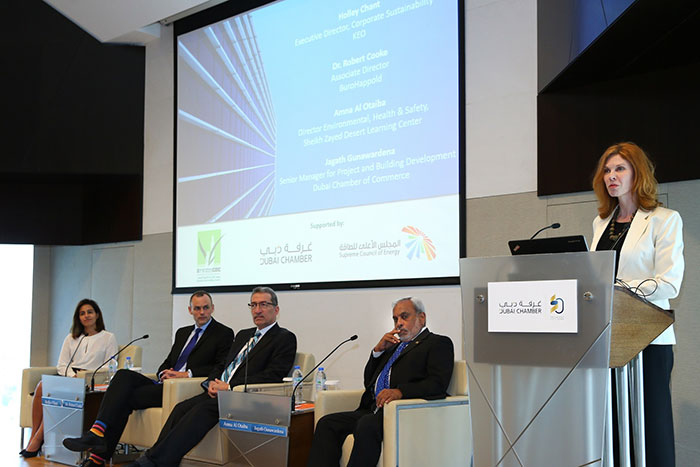EmiratesGBC lends momentum to achieve Nearly Zero-Energy Buildings in the UAE
 Other News
Other News Subscribe to newsletter
Subscribe to newsletter
| 11 May 2016 |
Emirates Green Building Council (EmiratesGBC), an independent forum aimed at conserving the environment by strengthening and promoting green building practices, put the spotlight on Nearly Zero-Energy Buildings (nZEBs) at a Focus Day organised in partnership with the Dubai Chamber of Commerce & Industry (Dubai Chamber) and the Dubai Supreme Council of Energy.

Discussing the definitions and innovations of Zero-Energy Buildings, the Focus Day is part of the ongoing series of industry events organised by EmiratesGBC to strengthen awareness and promote tangible action on built environment sustainability.
The Focus Day on nZEBs assume importance globally with the European Council and Parliament recasting the Energy Performance of Buildings Directive, mandating all EU member nations to submit national plans to achieve nearly zero-energy buildings. nZEBs have a wider importance for the UAE, in line with the ‘green vision’ announced by the government and the focus of the UAE Vision 2021 on sustainable development.
Saeed Al Abbar, Chairman of EmiratesGBC, said that the discussion on nZEBs sets the platform for concrete action to achieving the sustainable development goals of the nation. “The Focus Day lends momentum to the discussion on nZEBs by bringing together stakeholders from across the industry and government to share insights and identify actionable solutions to develop buildings that consume nearly zero energy.
“From defining the concept of ‘zero energy’ to identifying an action plan on how best we can work together to achieve nZEBs, the event will help industry stakeholders to work together, innovate and co-create ‘greener’ solutions. The UAE can set benchmarks globally in nZEBs through collaborative action by the industry and the greater participation of the public in energy management.”
Essa Al Zaabi, Senior Vice-President, Institutional Support Sector at Dubai Chamber, said that in line with the directives of His Highness Sheikh Mohammed bin Rashid Al Maktoum, UAE Vice President and Prime Minister and Ruler of Dubai, the emirate aims to be amongst the top ten most sustainable cities in the world by 2020.
“At Dubai Chamber, we have been following best practices in energy savings for the last 15 years by instating a number of energy-saving initiatives as we managed to reduce energy and potable water consumption per person by approximately 63% and 91% respectively. We have also strengthened our leadership in green buildings and corporate social responsibility by securing the first LEED Platinum Certificate for Existing Buildings in the Arab world. This demonstrates that older buildings can become environmentally-friendly with minimal costs and efforts.”
Experts at the event pointed out the importance of nZEBs, which consume low amounts of energy that can be covered from renewable energy source. Applying energy efficiency measures to improve the performance of the buildings beyond the mandatory building codes is a key step in achieving nZEBs. The level of renewables used or generated on site determines the status of the buildings as Nearly Zero-Energy, Net Zero-Energy or Energy Plus.
To achieve nZEBs in the UAE, energy consumption must be reduced from current levels by a factor of five, said experts. They pointed out that despite the harsh summer climate of the region, the concept of nZEBs is still viable and achievable.
On the other hand, the concept serves as a fresh template to install renewable energy systems and to reduce energy consumption by about 30 to 80 per cent using proven and commercially available technologies.
The participants said that in addition to reducing energy consumption, it is important to reduce use of electric appliances, use energy efficient appliances, and generate energy through natural sources to achieve nZEBs. They also said that human behaviour is important in considering nZEBs and that the occupants must understand that the internal environment and operation of a ZEB are not the same as a conventional building.
The definition of nZEBs in the UAE must be flexible against several factors including balancing boundaries and timeframes, metrics of balance and renewable energy supply options, said experts. They added that low energy buildings have the same mechanical, electrical and plumbing costs as traditional buildings.
The UAE has made significant advancements in built environment sustainability. As of October 2015, the nation has 192 LEED-certified buildings and more than 12,000 villas and 1,000 buildings in Abu Dhabi have secured the Estidama Design Pearl Rating.
EmiratesGBC organises a series of activities that are aimed to strengthening a culture of built environment sustainability in the region including the annual EGBC Awards to honour best practices in building sustainability. For more details, email: [email protected].




